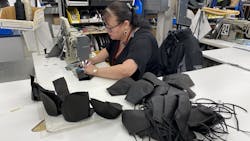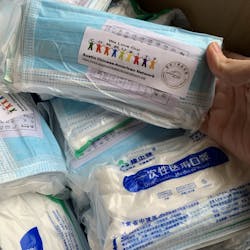Transit agencies turn attention toward face coverings for operators and riders
With new Centers for Disease Control and Prevention (CDC) guidance in place regarding the wearing of face covering to slow the spread of the novel coronavirus, transit agencies are looking to keep their employees equipped with masks and ensure riders take similar precautions.
On April 3, the CDC revised its previous guidance and now recommends cloth face coverings be voluntarily worn in situations where social distancing protocols may be difficult to maintain. The face covering recommendation is not for the N95 masks, which are being prioritized for medical personnel and other first responders.
Several transit agencies responded over the weekend with renewed calls for riders and agency frontline staff to protect themselves with face coverings.
As previously reported, New York Metropolitan Transportation Authority (MTA) says it has distributed 240,000 masks and 3.2 million gloves since March 1 to its workforce. Last week, MTA secured N95 face masks for its frontline transit workers, which will be cleaned and reused. On April 4, MTA had distributed 159,000 masks to New York City Transit, more than 40,000 masks to Long Island Rail Road, more than 36,300 masks to Metro-North and more than 12,400 masks to its Bridges and Tunnels workers.
While transit agencies work to continue service for essential workers, their communities have been coming together to help provide masks to operators. On Facebook, the Rebel Draft House in College Station, Texas, posted an image of yellow fabric and other supplies between its well socially distanced bartenders who were making masks for the Brazos Transit District. GRTC Transit System in Richmond, Va., received donated handmade masks from Joanne’s Fabrics West Chester Commons Midlothian and RVA Masks 4 Health.
GRTC Transit System is also encouraging riders to wear face coverings and is working to have masks available for riders. New Jersey Transit is also urging riders to voluntarily wear face coverings in line with the new CDC recommendations.
On the supply side, companies such as Freedman Seating Company, are working to produce masks for use by frontline workers. Freedman Seating is making masks from spunbound polypropylene material and has donated several hundred to first responders at the Chicago Police Department and will be producing an additional 700 for transit use.
While the CDC stresses the voluntary nature of wearing a face covering, some systems are mandating riders cover their faces in order to board vehicles. SunLine Transit Agency in Thousand Palms, Calif., will not allow riders without face coverings on vehicles. SunLine is under more strict guidance for face coverings following an order by the Riverside County Department of Health that all residents cover their faces when leaving home. Operators will also be wearing masks.
Another transit provider to make face coverings mandatory for riders is the Greater Peoria Mass Transit District (GPMTD) in Peoria, Ill. As of April 8, GPMTD says a face mask or an alternative protective face covering must be worn while riding all transportation services, including CityLink fixed route, paratransit and rural transportation, as well as while at the Transit Center facility.
“We take recommendations from the CDC and local health departments seriously, which has led us to now require passengers to wear face masks or other protective face coverings while riding our transportation services or waiting for the bus at our Transit Center facility,” said CityLink General Manager Doug Roelfs.
About the Author

Mischa Wanek-Libman
Group Editorial Director
Mischa Wanek-Libman is director of communications with Transdev North America. She has more than 20 years of experience working in the transportation industry covering construction projects, engineering challenges, transit and rail operations and best practices.
Wanek-Libman has held top editorial positions at freight rail and public transportation business-to-business publications including as editor-in-chief and editorial director of Mass Transit from 2018-2024. She has been recognized for editorial excellence through her individual work, as well as for collaborative content.
She is an active member of the American Public Transportation Association's Marketing and Communications Committee and served 14 years as a Board Observer on the National Railroad Construction and Maintenance Association (NRC) Board of Directors.
She is a graduate of Drake University in Des Moines, Iowa, where she earned a Bachelor of Arts degree in Journalism and Mass Communication.

